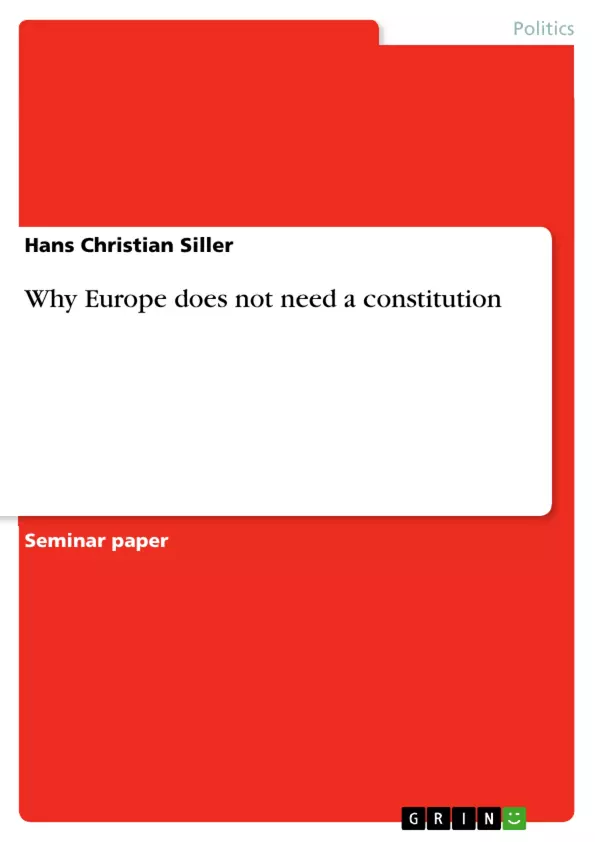In the last months the discussion about a European Constitution has gained further popularity with the highly controversial speech of German foreign minister Joschka Fischer at the Humboldt University3. Until recently, most draft constitutions like the Spinelli initiative of the European Parliament in 1994 or the Herman Report in 1994 were discussed on a theoretical level without a hope for realization. Now there is a wave of speeches and contribution of key politicians on this subject. In fact, there are reasons to assume that there is more to it that just the typical German focus on constitutionalism4 but that “a window of opportunity is opening”5: the need for legal and institutional reform becomes evident in view of the incipient eastern enlargement and the results of the Amsterdam Conference and its postponing strategy have satisfied only few. Moreover, the fact that ECSC expires in 2002 gives further monumentum to the discussion about where Europe should be heading in the years to come and how the problems of a deeper and enlarged Union can be overcome.
1 see Schneider, Heinrich: Gesamteuropäische Herausforderungen an eine Europäische Union, in: Wildenmann, Rudolf (Hrsg.): Staatswerdung Europas? Optionen für eine Europäische Union, Baden-Baden Nomos, 1991 (Studien zur gesellschaftlichen Entwicklung, Bd. 9), pp. 125.
2 see Weidenfeld, Werner: Die Reformbilanz der Europäischen Gemeinschaft: ′Bundesrepublik Europa′ als Perspektive? in: Weidenfeld, Werner/Wessels, Wolfgang (Hrsg.): Wege zur Europäischen Union. Vom Vertrag zur Verfassung? Bonn Europa Union, 1986, pp. 28, and Hertel, Wolfram: Supranationalität als Verfassungsprinzip. Normativität und Legitimation als Elemente des Europäischen Verfassungsrechts, Berlin Duncker und Humblot, 1999 (Tübinger Schriften zum internationalen und europäischen Recht, Bd. 47), Diss. Univ. Tübingen 1998, pp. 21.
3 Fischer, Joschka: Vom Staatenbund zur Föderation – Gedanken über die Finalität der europäischen Integration. Rede am 12. Mai 2000 in der Humboldt-Universität in Berlin, http://www.auswaertiges-amt.de/4_europa/index.htm.
4 Kohler-Koch, Beate: A Constitution for Europe?, Mannheim, 1999 (Arbeitspapiere - Mannheimer Zentrum für Europäische Sozialforschung, Bd. 8), pp. 2.
5 ibid. pp. 3.
Inhaltsverzeichnis (Table of Contents)
- I. Introduction
- II. Does the EU have a constitution?
Zielsetzung und Themenschwerpunkte (Objectives and Key Themes)
This work examines the question of whether the European Union (EU) needs a constitution. It analyses the current legal system of the EU and assesses whether the founding treaties can be considered a constitution. The author argues that the EU does not need a constitution and that it is neither a state nor a typical international organization.
- The characteristics of a constitution and its historical development.
- The unique features of the EU as a supranational entity.
- The debate about the need for a constitution in the context of European integration.
- The limitations of a constitution for the EU.
- The potential consequences of introducing a European constitution.
Zusammenfassung der Kapitel (Chapter Summaries)
- I. Introduction: The introduction provides an overview of the historical context of the debate about a European constitution, highlighting key figures and events. It then outlines the structure of the paper and the main arguments that will be presented.
- II. Does the EU have a constitution?: This chapter analyzes the concept of a constitution and its characteristics. It then examines whether the current legal framework of the EU can be considered a constitution, considering the EU’s unique position between a state and a traditional international organization. The chapter explores arguments for and against the existence of a constitution within the EU.
Schlüsselwörter (Keywords)
The main keywords and focus topics of the text are European Union, constitution, supranationality, international law, state, sovereignty, integration, legal system, founding treaties, and European Court of Justice. These keywords encompass the core concepts and arguments of the work, which examines the nature and future of the EU in relation to the question of a constitution.
Frequently Asked Questions
Does the European Union already have a constitution?
The paper discusses whether the existing founding treaties and the rulings of the European Court of Justice already function as a 'de facto' constitution.
Why is the debate about a European Constitution controversial?
Controversy arises from the EU's unique status: it is neither a single sovereign state nor a traditional international organization, making a formal constitution problematic for national sovereignty.
What was Joschka Fischer's role in this debate?
His famous speech at Humboldt University in 2000 gave significant momentum to the discussion about the 'finality' of European integration and the need for a constitutional framework.
What are the main arguments against an EU constitution?
Arguments include the lack of a single European 'demos' (people), the risk of over-centralization, and the sufficiency of the current legal system based on treaties.
What is supranationality in the context of the EU?
It refers to the EU's power to create laws that are directly applicable in member states, transcending traditional international law between independent nations.
- Arbeit zitieren
- M.A. Hans Christian Siller (Autor:in), 2000, Why Europe does not need a constitution, München, GRIN Verlag, https://www.grin.com/document/5484



